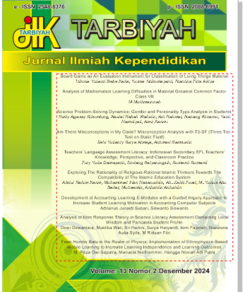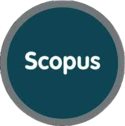Teachers’ Language Assessment Literacy: Indonesian Secondary EFL Teachers’ Knowledge, Perspective, and Classroom Practice
DOI:
https://doi.org/10.18592/tarbiyah.v13i2.13602Keywords:
assessment literacy, classroom practice, perspective, secondary EFL teachers, teachers’ knowledgeAbstract
The primary objective of this study was to investigate secondary school EFL teachers' understanding, perspectives, and classroom practices regarding language assessment literacy. This research was conducted in three different backgrounds of schools. This study employed case study research and the theoritical framework of the Teachers Assessment Literacy Questionnaire (TALQ) proposed by Plake et al. The data was obtained by the questionnaire, interviews, and classroom observation, then analyzed using thematic analysis. The result showed that the teachers already had excellent knowledge and positive perspectives regarding assessment literacy. Their knowledge, perspective, and classroom practice involved a) the relevance between assessment method and instructional objectives, b) the development of assessment and management of learning outcomes, c) the benefits of assessment, d) the form of assessments, e) the ranking of assessments results f) unethical action in conducting assessment. This study might contribute to the teachers' carrying out assessments following standards, and educational institutions should be aware of the teachers' competency to increase teachers' competence and enthusiasm in carrying out better assessments.References
Aditomo, A. (2019). Menghapus ujiannasional. Retrieved from https://ninoaditomo.blogspot.com, on1 March, 2019.
Alkharusi, H. (2011). Teachers’ Classroom Assessment Skills: Influence of Gender, Subject Area, Grade Level, Teaching Experience and In-Service Assessment Training. Journal of Turkish Science Education, 8(2), 39–48.
Al-bahlani, S. M. (2019). Assessment literacy: A study of EFL teachers’ assessment knowledge, perspectives, and classroom behaviors. [Doctoral dissertation, The University of Arizona]. The University of Arizona. https://repository.arizona.edu/handle/10150/633240
American Federation of Teachers (AFT), National Council on Measurement in Education (NCME), & National Education Association (NEA). (1990). Standards for teacher competence in educational assessment of students. Buros Center for Testing.
Aria, D., Sukyadi, D., & Kurniawan, E. (2021). Teacher assessment literacy: Indonesian EFL secondary teachers’ self-perceived on classroom-based assessment practice. English Review: Journal of English Education, 10(1), pp. 15-26. doi:https://doi.org/10.25134/erjee.v10i1.5349
Ashraf, H., & Zolfaghari, S. (2018). EFL teachers’ assessment literacy and their reflective teaching. International Journal of Instruction, 11(1),425–436. https://doi.org/10.12973/iji.2018.11129a
Brindley, G. (2001). Language assessment and professional development. In C. Elder, A.
Brookhart, S. M. (2011). Educational assessment knowledge and skills for teachers. Educational Measurement: Issues and Practice, 30 (1), 3–12.
Campbell, C., & Collins, V. L. (2007). Identifying essential topics in general and special education introductory assessment textbooks. Educational Measurement: Issues and Practice, 26(1), 9-18
Cheng, Liying and Janna Fox (2017). Assessment in the Language Classroom: Teachers Supporting Student Learning. Palgrave.
Gultom, E. (2016). Assessment And Evaluation In Efl Teaching And Learning. Assessment and Evaluation in Efl Teaching and Learning, 190–198.
Davies, A. (2008). Textbook trends in teaching language testing. Language Testing, 25(3), 327–347. https://doi.org/10.1177/0265532208090156
Deluca, C., & Klinger, D. A. (2010). Assessment literacy development: Identifying gaps in teacher Candidates’ learning. Assessment in Education: Principles, Policy and Practice, 17(4), 419–438. https://doi.org/10.1080/0969594X.2010.516643
F. Giraldo, Language assessment literacy: Implications for language teachers. Profile: Issues in Teachers' Profesional Development, 2018, 20: 179-195.
Frank, J. (2012). The Roles of Assessment in Language Teaching. In English Teaching Forum. https://files.eric.ed.gov/fulltext/EJ997527.pdf
Howell, C. A. (2013). Development and Analysis of a Measurement Scale for Teacher Assessment Literacy. East Carolina University https://doi.org/10.14483/udistrital.jour.calj.2015.2.a09.
Hutami, D., Nur, H. (2023). Investigating Teachers’ Language Assessment Literacy In The Implementation of Merdeka Belajar (freedom of learning) Curriculum. Voices of English Language Education Society, 7(1), 44-56. http://dx.doi.org/10.29408/veles.v7i1.7624
Magdalena, I., Fauzi, H. N., & Putri, R. (2020). Pentingnya evaluasi dalam pembelajaran dan akibat memanipulasinya, Jurnal pendidikan dan Sains, (2)
Koh, K., Burke, L. E. C. A., Luke, A., Gong, W., & Tan,C. (2017). Developing the assessment literacy of teachers in Chinese language classrooms: A focus on assessment task design. Language Teaching Research, 22(3),264 288. https://doi.org/10.1177/1362168816684366
Lam, R. (2015). Language assessment training in Hong Kong: Implications for language assessment literacy. Language Testing, 32(2), 169–197. https://doi.org/10.1177/0265532214554321
Luthfiyyah, R., Basyari, I. W., & Dwiniasih. (2020). EFL Secondary Teachers ’ Assessment Literacy: Assessment Conceptions and Practices. Journal on English as a Foreign Language, 10(2), 402–421.
Mas’udi, (2014), Evaluasi Simtem Pembelajaran, Thufula, (317-331).
Meidasari, V. E. (2015). The Assessment and Evaluation in Teaching English as a Foreign Language. Indonesian EFL Journal, 1(2), 224–231. https://doi.org/10.25134/ieflj.v1i2.629
Mellati, M., & Khademi, M. (2018). Exploring teachers’ assessment literacy: Impact on learners’ writing achievements and implications for teacher 112 development. Australian Journal of Teacher Education, 43(6), 1–18. https://doi.org/10.14221/ajte.2018v43n6.1
Miles, Mathew B., A. Michael Huberman, and Johnny Saldaña. (2014). Qualitative Data Analysis: A Methods Sourcebook Third Edition. SAGE Publication,
Plake, B. S., & Impara, J. C. (1993). Assessment competencies of teachers: A national survey. Educational Measurement: Issues and Practice, 12, 10-25
Tosuncuoglu, I. (2018). Importance of Assessment in ELT. Journal of Education and Training Studies, 6(9), 163–167. https://doi.org/10.11114/jets.v6i9.3443
Said, H., Ahmad, I., Khan, F., Awang, Z., Yasin, M. A.-M., & Summintono, B. (2013). The Effect of Training on Teachers’ Attitude Toward Assessment as Learning. World Applied Sciences Journal, 25(1), 36–41. https://doi.org/10.5829/idosi.wasj.2013.25.01.1333
Shim, K.N. (2009). An Investigation into Teachers’ Perceptions of Classroom-Based Assessment of English as a Foreign Language in Korean Primary Education. Doctoral Thesis.University of ExeteStiggins, R. (1991). Assessment literacy. The Phi Delta Kappan, 72(7) (Mar., 1991), Pp. 534-539, 72(7), 534–539.
Sumardi, S., & Guci, R. I. (2023). HOTS-based language assessment literacy: Challenges and prospects in English language teaching. Indonesian Journal of Applied Linguistics, 12(3),831-840. https://doi.org/10.17509/ijal.v12i3.44261
Stiggins, R. (1991). Assssment literacy. The Phi Delta Kappan, 72(7) (Mar., 1991), Pp. 534-539, 72(7), 534–539.
Tsagari, D., & Vogt, K. (2017). Assessment literacy of foreign language teachers around Europe: research, challenges, and future prospects. Papers in Language Testing and Assessment,6(1), 41 – 63.
Vogt, K., & Tsagari, D. (2014). Assessment literacy of foreign language teachers: Findings of a European study. Language Assessment Quarterly, 11(4), 374–402. https://doi.org/10.1080/15434303.2014.960046
Vogt, K., Tsagari, D., & Spanoudis, G. (2020). What do teachers think they want? a comparative study of in-service language teachers’ beliefs on LAL training needs. Language Assessment Quarterly, 00(00), 1–24. https://doi.org/10.1080/15434303.2020.1781128
Yin, R. K. (2018). Case Study Research and Applications: Design and Methods (6th ed.). Thousand Oaks, CA: Sage.
Zulaiha, S., Mulyono, H., & Ambarsari, L. (2020). An investigation into EFL teachers’ assessment literacy: Indonesian teachers’ perceptions and classroom practice. European Journal of Contemporary Education, 9(1), 189–201. https://doi.org/10.13187/ejced.2020.1.189
Downloads
Published
How to Cite
Issue
Section
License
Copyright (c) 2024 Fury Yulia Damayanti, Endang Setyaningsih, Sumardi Sumardi

This work is licensed under a Creative Commons Attribution 4.0 International License.
Authors retain copyright and grant the journal right of first publication with the work simultaneously licensed under a Creative Commons Attribution 4.0 International License that allows others to share the work with an acknowledgment of the work's authorship and initial publication in this journal.




